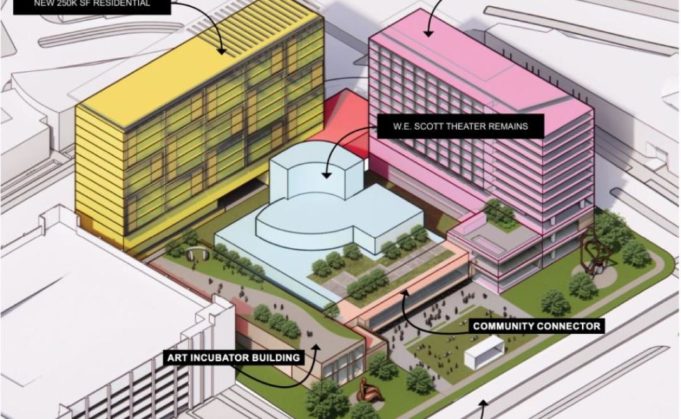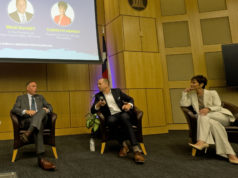The Cultural District continues to attract many of the largest and most lucrative developments in Tarrant County — a reminder of the value of the arts in driving economic growth. To the immediate north of the Modern Art Museum of Fort Worth and Kimbell Art Museum, Fort Worth developer John Goff is finishing several upscale projects collectively called The Crescent which will cater solely to wealthy folks like himself. Based on the Crescent’s website, rent at one of Goff’s apartments starts at $4,000 a month, which is about how much the average Fort Worthian earns in that timespan. Life must be good at the top.
Nearby Dickies Arena, which was paid for with around $250 million in taxpayer funds yet is privately owned, is generating much of the demand for new construction in the bustling neighborhood. The Cultural District’s economic prowess has not been lost on many locals, who are closely following plans to redevelop the Fort Worth Community Arts Center through a public-private partnership. As with Dickies’ buildout from scratch, redeveloping 1300 Gendy Street would involve outside money. Last year, city council appointed a task force to propose options for restoring or refurbishing the community space as arts advocates voiced concern that the process would inevitably become driven by corporate interests.
Several dozen people gathered at the community arts center on Wednesday for an update on the restoration process. Presenting for Garfield Public-Private, one of two developer finalists, architect Michael Bennett said he would reach out to the community for feedback on project plans that preserve the arts center’s W.E. Scott Theater and surrounding trees. A spokesperson for Support Public Art said in a public statement after the presentation that art appeared to be an “afterthought” for the Garfield team. Wesley Kirk said the plans made no mention of Arts Fort Worth, the nonprofit tasked with managing the arts center, and Kids Who Care, one of the largest and most active tenants in the community space.
Garfield, Support Public Art’s Kirk continued, “say they want to understand and work with the community on the design, but the fact that their first draft is so far off the mark is concerning.”
Next up was Goldenrod Companies, an investment and development group currently building two large developments in the West 7th corridor. Goldenrod’s plans leave the arts center fully intact while adding residential and hotel spaces nearby.
“This building is pretty significant, and we should take a harder look at preserving this asset,” said John Zogg, Goldenrod’s southwest region president.
Goldenrod plans to place a hotel and apartment on public grounds along with potential new performance spaces and plazas.
A “landgrab” is what local artist Trista Morris called it.
“Rich people have a tendency to look at artists as a commodity, to be a fun thing to have around,” Morris said in a TikTok. “That is not our purpose. Art did not seem like a large part of their plan. They are going to drive away what is so special about this city.”
Several audience members asked why only two of four groups that submitted Requests for Proposals (RFPs) were allowed to speak that evening. A city spokesperson said a panel had eliminated the other RFPs without explaining how or why those decisions were made.
The arts center is a publicly owned building on public land, and its purpose has historically and rightfully been to serve the community by offering affordable programming for citizens and opportunities for artists. Community arts centers were never intended to pander to the interests of hoteliers, well-monied developers, and investors, as slick as their slides and selling points are. It would be easy to direct ire at the opportunistic capitalists who now have full control over the fate of our city’s only substantial arts center, but the real fault lies with our city council, who clearly misled the public on the real reasons for pushing for a “public-private” partnership for redeveloping the arts center. Our city leaders may lack the self-awareness to appreciate the irony that their rush to cash in on the Fort Worth Community Arts Center comes at the expense of the very people who made the building valuable in the first place — the artists.
The city-led process of awarding the final contract to an outside group is nearly complete with two groups proposing their plans that will be judged by city council in January. Fort Worthians can provide feedback by emailing FMSPurchasingResponses@fortworthtexas.gov through Monday, Oct 16.
This column reflects the opinions of the editorial board and not the Fort Worth Weekly. To submit a column, please email Editor Anthony Mariani at Anthony@FWWeekly.com. He will gently edit it for clarity and concision.












